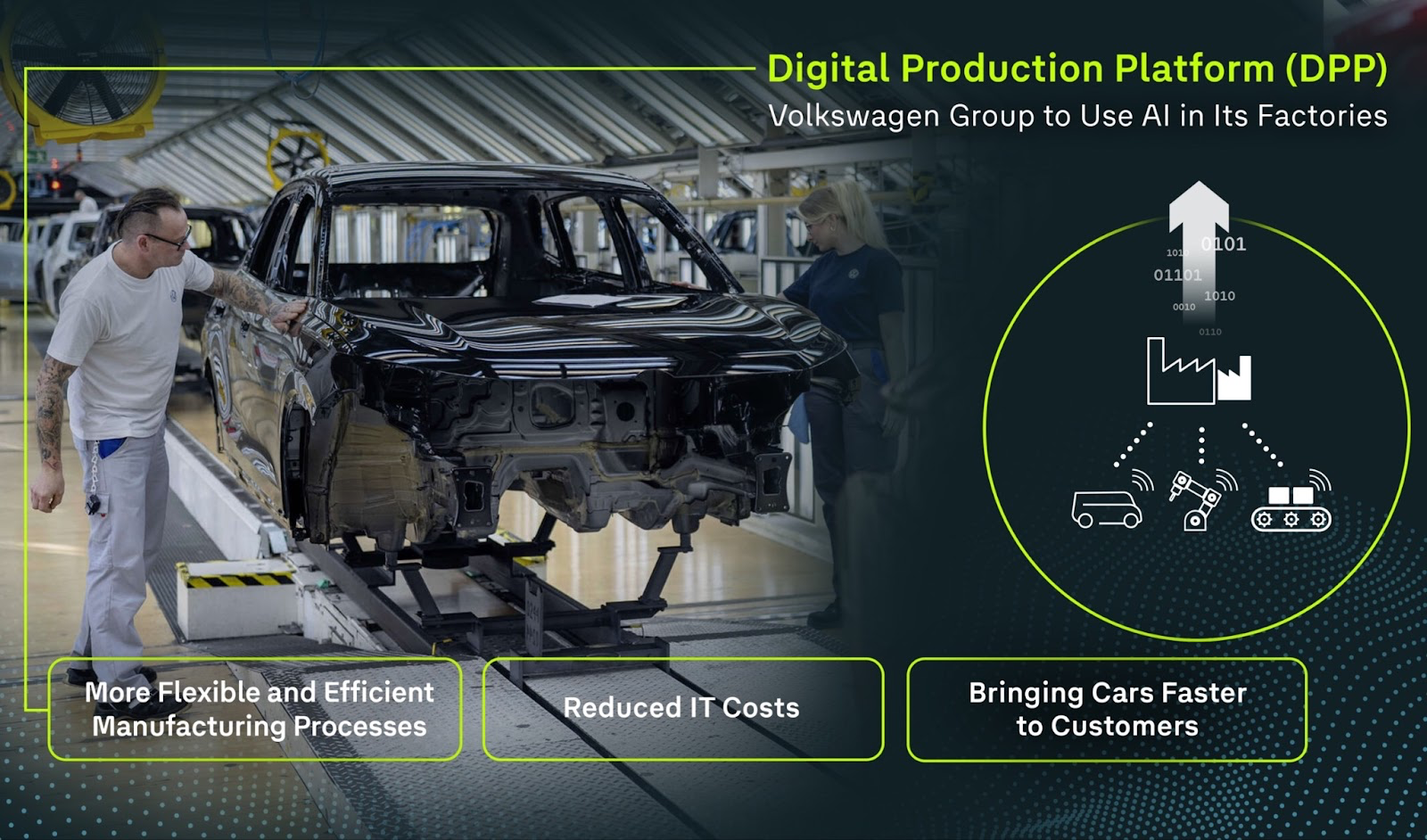
The global automotive industry is undergoing one of the biggest transformations in its history. Software, artificial intelligence (AI), and data-driven solutions are no longer optional add-ons. They are becoming the core of how vehicles are designed, manufactured, and delivered to customers. In this landscape, Volkswagen is positioning itself as a leader by expanding its Digital Production Platform (DPP), developed in partnership with Amazon Web Services (AWS).
Originally introduced as an industrial partner network, the DPP has grown into a critical digital backbone that connects Volkswagen’s global production network. By linking order intake, logistics, and manufacturing processes, the DPP ensures seamless data flows across the value chain. This capability is essential for achieving the company’s goal of widespread AI integration and preparing for the future of software-defined vehicles.
With 43 factories across Europe, North America, and South America already connected to the platform and a total of 114 production facilities worldwide, Volkswagen is laying the foundation for smarter, faster, and more resilient manufacturing.
The Digital Nervous System of Volkswagen Factories
The DPP is best described as the digital nervous system of Volkswagen’s factories. It integrates data from different stages of production and ensures that every process is aligned in real time. For a company that produces millions of vehicles annually, this level of connectivity is not only valuable, it is mission-critical.
This vision highlights Volkswagen’s broader strategy which is to transform from a traditional car manufacturer into a technology-driven company where data and AI play a central role.
Efficiency and Cost Savings at Scale
One of the biggest advantages of the DPP is its ability to standardize IT systems across Volkswagen’s global factories. Instead of each site deploying its own customized tools, the DPP enables uniform rollouts of new digital solutions.
A clear example is the Guided Vehicle Completion system, a digital tool designed to streamline coordination in vehicle assembly. It helps manage the complexity of modern production lines, where each car may have thousands of configuration options. The solution is already in use at 13 plants under Volkswagen, Audi, and Volkswagen Commercial Vehicles, proving its scalability and impact.
AWS plays a vital role by providing the cloud infrastructure that makes these solutions reliable and scalable. Hosting critical production systems in the cloud reduces the risk of line stoppages and ensures that new tools can be introduced without major disruptions. Thanks to these efficiencies, Volkswagen is already realizing savings in the double-digit million range.
Beyond cost, the standardization of systems is creating a unified data foundation. This shared foundation is essential for applying AI consistently across sites, enabling Volkswagen to improve not just efficiency but also quality and innovation.
AI at the Core of Volkswagen’s Transformation
Volkswagen has integrated more than 1,200 AI applications into its operations, spanning production, logistics, quality control, and sustainability.
One standout example is KI4UPS, an AI solution that supports assembly line teams during vehicle software deployment. It helps identify potential electronic issues more quickly, reducing manual work and allowing faster resolution of problems. This not only improves efficiency but also boosts the reliability of vehicles before they leave the factory floor.
Sustainability is another area where AI is making an impact. At Volkswagen’s plant in Poznań, Poland, AI is used to optimize electricity consumption. The results speak for themselves, a 12% reduction in energy costs and a significant decrease in CO₂ emissions. These achievements demonstrate how digital solutions can support both business performance and environmental goals.
AI also plays a role in real-time quality control. At production sites in Wolfsburg and Ingolstadt, for example, AI-powered image analysis ensures that each component is installed correctly. This system can detect errors instantly, allowing immediate corrections and reducing the risk of costly rework. For customers, this translates into higher quality vehicles; for Volkswagen, it means more efficient use of time and resources.
The automotive industry is moving toward a future where vehicles are increasingly defined by software rather than hardware. Features will be managed, updated, and even monetized through digital platforms. Volkswagen is preparing for this shift by ensuring that its manufacturing processes are aligned with the demands of Software-Defined Vehicles (SDVs).
The DPP will play a central role in this transition. By enabling direct software deployment during manufacturing, it ensures that vehicles can be equipped with the latest digital capabilities from day one. This approach is further supported by Volkswagen’s joint venture with Rivian Automotive, which focuses on developing next-generation electronics architecture and vehicle software.
What makes this partnership significant is the ability to adapt existing AI solutions, like KI4UPS, to the new electronics framework. This flexibility allows Volkswagen to leverage Rivian’s rapid development cycles without compromising on production stability.
At the heart of this transformation is Volkswagen’s deep collaboration with AWS. The two companies have extended their partnership for five years, combining AWS’s expertise in cloud infrastructure, Internet of Things (IoT), and machine learning with Volkswagen’s manufacturing knowledge.
Beyond Volkswagen, the DPP has implications for the broader industrial landscape. The platform is designed to be compatible with industry standards such as Catena-X, ensuring that it can integrate into wider networks of suppliers, partners, and competitors. In the medium to long term, the DPP is expected to represent large parts of Volkswagen’s production system while also serving as a model for digital transformation in manufacturing.
This interoperability means that Volkswagen’s innovations could contribute to industry-wide improvements, reinforcing its position not only as an automotive leader but also as a digital pioneer.
The partnership between Volkswagen and AWS is reshaping the future of automotive manufacturing. Through the Digital Production Platform, Volkswagen is creating a more efficient, cost-effective, and resilient production system while laying the foundation for AI-driven and software-defined vehicles.
With over 1,200 AI applications already in place, measurable savings in the millions, and sustainability gains such as reduced energy costs and emissions, the results are tangible. Yet the DPP is more than just a tool for operational efficiency, it represents a strategic shift toward a future where data and AI drive innovation across the entire value chain.
Shahriena Shukri is a journalist covering business and economic news in Malaysia, providing insights on market trends, corporate developments, and financial policies. More about Shahriena Shukri.




